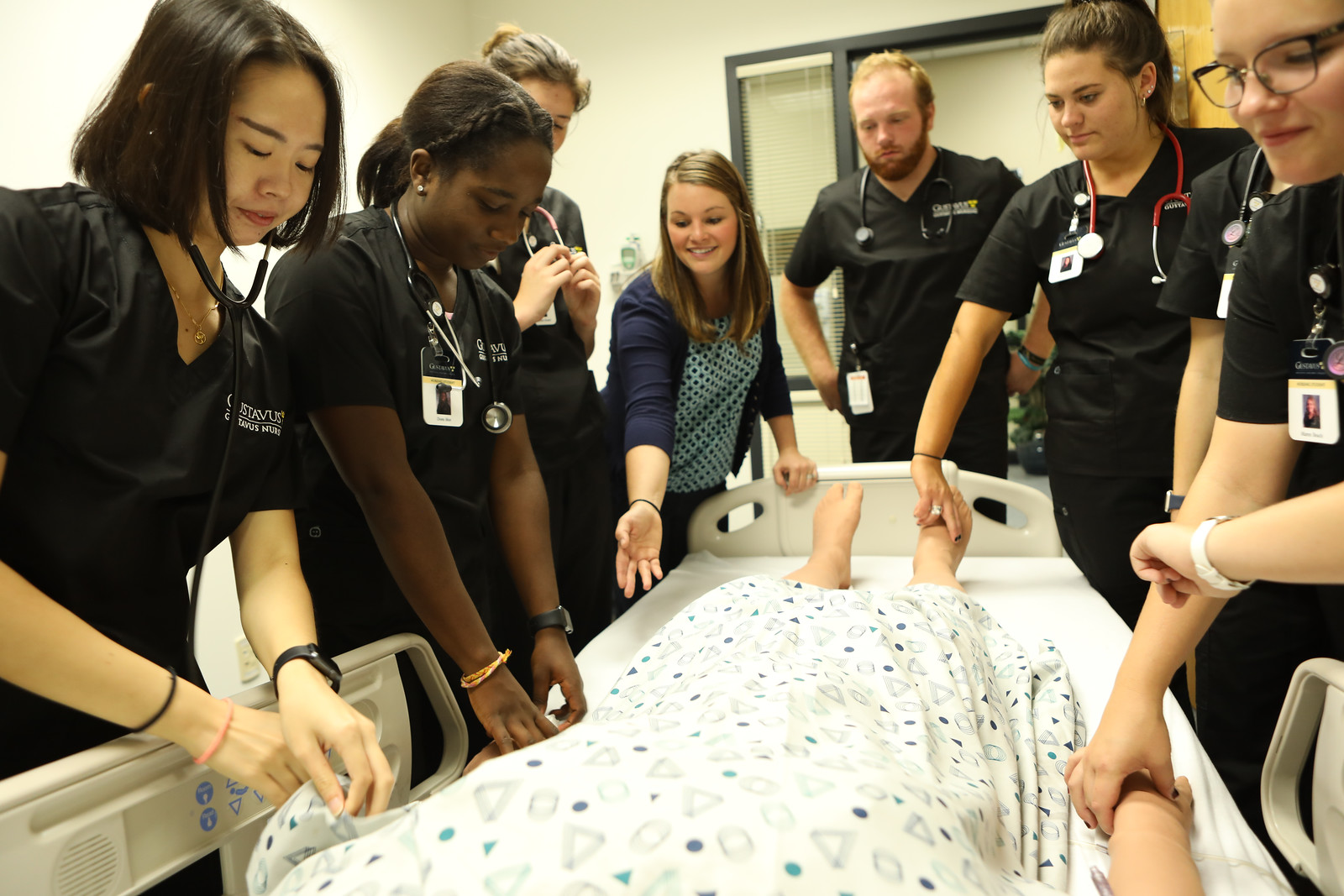The Gustavus Adolphus College Department of Nursing is broadening its capacity for providing clinical experience to students thanks to a gift from a program alumna. The $150,000 gift from Dr. Barbara Weissenberg Achter ’66 and her husband, Dr. Morton Achter, enables the nursing program to bolster its simulation lab, an important part of the clinical education for Gustavus nursing students.
The Gustavus nursing program graduates 30 students each year. As a program in a rural community, the Gustavus department does not have access to the same on-site clinical opportunities as some nursing programs in larger cities. The simulation lab is therefore necessary to students’ clinical experience. The on-campus facility provides nursing students with opportunities to practice their assessment and decision-making skills through various situational experiences.
The simulation lab includes telehealth video links with partner institutions, which allow Gustavus students to observe real-time procedures. Students also exercise their hands-on skills with patient simulators. These computerized manikins can be programmed to exhibit different health symptoms or conditions. The manikins then respond realistically to student treatments. In 2014, the National Council of State Boards of Nursing (NCSBN) determined that high-quality simulation experiences can substitute for up to 50 percent of traditional clinical hours.
“Simulation allows for students to develop critical thinking skills in a safe environment,” said Dr. Heidi Meyer ’98, chair of the Gustavus nursing department. “These experiences provide students with opportunities to develop not only physical assessment skills, but also leadership, communication, conflict management, and time management skills. The Gustavus nursing program is able to better equip future practicing professional nurses with skills that will transform patient care at multiple levels.”
Part of the Achters’ gift is directed toward replacing an out-of-date manikin. High-fidelity simulators have a lifespan of roughly 10 years, and they cost between $70,000 and $80,000 to replace. By replacing the older manikin, the department seeks to ensure that the lab has three high-fidelity simulators. In addition, the Achters gave toward an endowment fund for future technology purchases as well as training, maintenance, and replacement of equipment. The endowment fund was established by Gustavus nursing alumni from the Class of 1969.
Barbara Weissenberg Achter graduated from the nursing program during the time when Gustavus students spent two years on campus and then two years at the Bethesda Hospital School of Nursing in St. Paul. She went on to earn her doctorate and taught nursing at Otterbein University and other institutions before becoming Vice President for Academic Affairs at Ferris State University. Her husband taught music at different colleges and conservatories.
“I have wonderful memories of my years at Gustavus, and am deeply appreciative of my liberal arts education and preparation for nursing practice,” Achter said. “The experiences at Gustavus served me well for a career which included direct patient care and teaching future nurses, as well as leadership and administrative positions.”
Achter recognized that a well-equipped simulation lab is vital for nursing education today. The COVID-19 pandemic made simulation training even more urgent. The pandemic restricted opportunities for clinical experience in acute- and critical-care settings. With hands-on learning options limited for students, the simulation lab played an essential role in preparing Gustavus nursing students.
“The recent coronavirus pandemic impacted the number and types of traditional clinical hours and experiences the students were able to participate in,” said Meyer. “Moving forward, the program plans to balance simulation and traditional clinical experiences in an effort to expand the opportunities for students to acquire knowledge and skills for working with individuals, families, and communities in promoting healing and wellbeing across the lifespan.”
According to Meyer, the importance of simulation training will not decline after the pandemic. With more than one million nurses due to retire in the next decade, and with an aging population putting greater demands on the health care system, there will be an ongoing need for nurses.
“The nursing program is truly grateful to have alumni who continue to support the nursing program with their gifts and talents,” Meyer said. “These generous donations allow for continued excellence and innovation in preparing the next generation of holistic care providers, leaders, researchers, and advocates.”
To learn more about nursing at Gustavus, please visit the departmental website.

Leave a Reply
You must be logged in to post a comment.